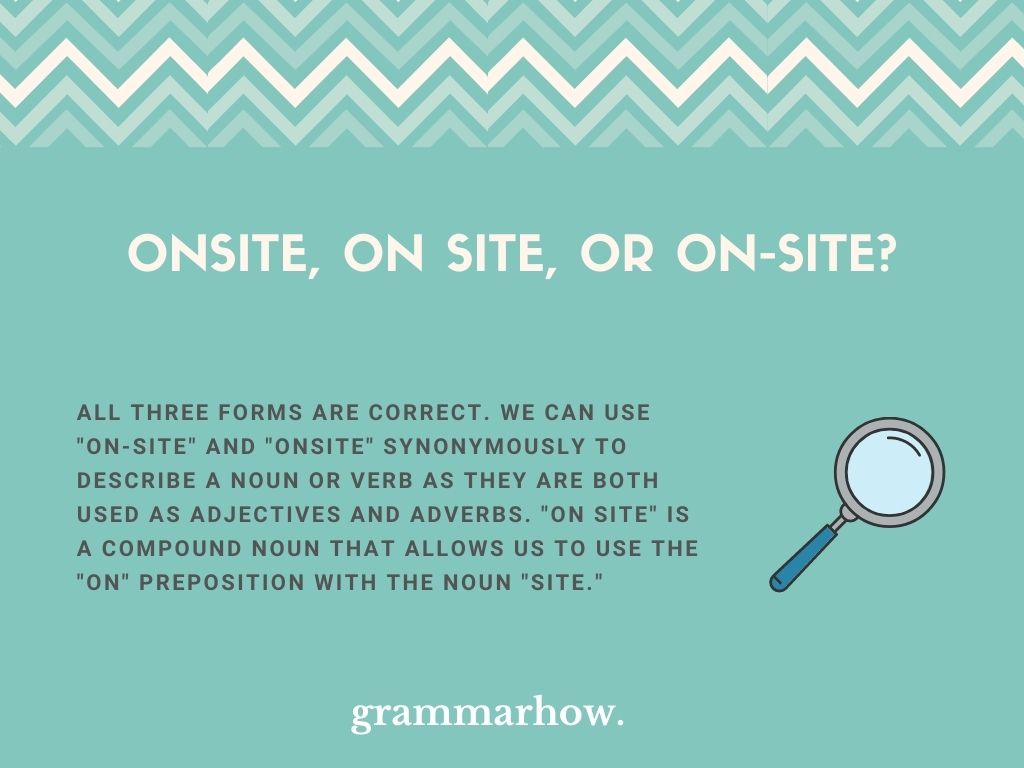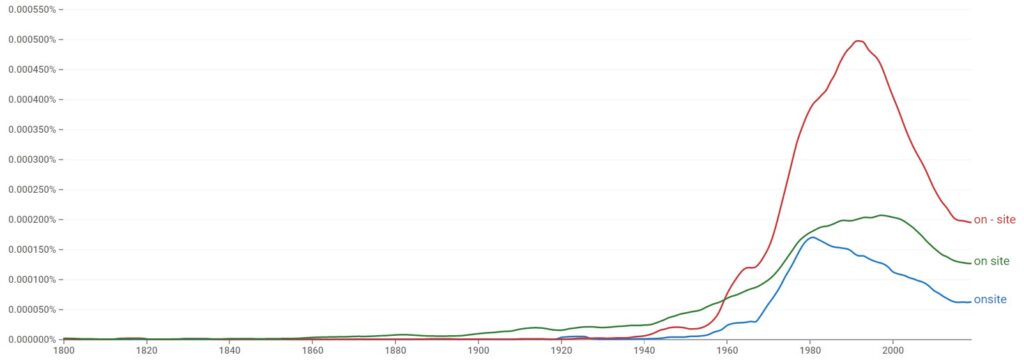“Onsite” has a few different spellings that we need to discuss. It works as one or two words, but it also seems to work as a hyphenated form. This article will explore all the rules you need to remember.
On site vs. On-site vs. Onsite
All three forms are correct. We can use “on-site” and “onsite” synonymously to describe a noun or verb as they are both used as adjectives and adverbs. “On site” is a compound noun that allows us to use the “on” preposition with the noun “site.”

According to Google Ngram Viewer, “on-site” is the most popular of the three, but there isn’t much in it. “On site” is the second most popular choice, and the grouped variation of “onsite” is third.

The Cambridge Dictionary and The Oxford Dictionary offer entries for all three forms. “Onsite” and “on-site” are the most obvious ones. They are both defined clearly as adjectives and adverbs, showing that they can be grouped or hyphenated.
While there isn’t a direct entry for “on site” as two words, there are no particular reasons why it can’t work. In fact, if you search “on site” as two words, you are redirected to the “site” entry page, which shows you how the preposition interacts with the noun.
Is “Onsite” One Word?
“Onsite” works best as one word. We can use it as an adjective or adverb when it’s used in this way. It’s a great way to show that something is happening on a particular site, though it works best to describe a noun rather than as a standalone descriptor.
These examples should give you all the information you need about it:
- I have a few onsite details that should help us understand more about this.
- There’s an onsite protest about wages, and I don’t think it’s wise for you to go out there and see those people right now.
- Let’s not get the onsite facilities out of order by being stupid! We need these for a while yet.
- It’s not all about the onsite issues, but it’s definitely something that we should be able to work through together.
Is “On site” Two Words?
“On site” works as two words when it refers to the noun form. It’s more common to see it as two separate words when we want to make it clearer that something is specifically on a site. We use “on” as a preposition in this case to keep the words separate.
These examples should clear a few things up:
- If he isn’t on site by the end of the day, then I don’t want anything more to do with him.
- There are many places on site that are worth checking out if you have the time.
- We have plenty of things on site that should give you a hand with this.
- It’s not on site because we didn’t see much point in having it there!
Is “On-site” Hyphenated?
“On-site” is hyphenated as an adjective or adverb. It’s mainly used in its hyphenated form as an adjective because this allows us to stay closer to English rules. We typically hyphenate compound adjectives when they modify the same noun in a sentence.
AP Stylebook guidelines allow us to use hyphens when working with compound adjectives. If more than one word needs to modify the same noun, the hyphen is what we use to link the two words with each other to help us understand them.
Here are some examples that show you the hyphenated form.
- They have a few on-site facilities that would be a good help for this.
- I don’t like any of the on-site workers right now, and I think it’s better if we let most of them go.
- They’re not on-site, and I need to find a group of people who are willing to get this job done quickly for me.
- Can you find out where the on-site records are kept? I’d like to find out whether we can continue working this way.
Is “Site” Capitalized In The Word “On-Site”?
Generally, there is no reason to capitalize both parts of the hyphenated “on-site.” It does not require capitalization unless it starts a sentence, which means only “On” would need a capital letter.
However, if you write it as part of a title, you might find it works to capitalize it to be “On-Site.” This will help it to stay more true to the rest of your title style.

Martin holds a Master’s degree in Finance and International Business. He has six years of experience in professional communication with clients, executives, and colleagues. Furthermore, he has teaching experience from Aarhus University. Martin has been featured as an expert in communication and teaching on Forbes and Shopify. Read more about Martin here.
